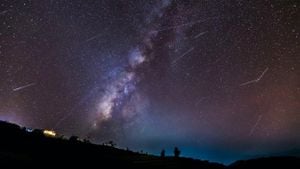World leaders found themselves scrambling to address alarming threats from Russian President Vladimir Putin, as revelations emerged about the intense crisis meetings held following serious concerns over the possibility of nuclear escalation during the war in Ukraine. According to Out of the Blue, a biography of former British Prime Minister Liz Truss, her final days as the UK’s leader were spent furiously poring over weather reports and preparing contingency plans for potential nuclear fallout.
This anxiety was spurred by intelligence assessments from the United States, which reportedly indicated there was a shocking 50% chance of Russia deploying nuclear weapons. The HBO of the biography revealed how Truss and her advisers were deeply concerned about the potential ramifications of such actions, especially the impact of weather patterns on the distribution of radioactive materials post-explosion.
Truss, who held office for only 45 days, was said to have dedicated several hours to studying satellite weather data, fearing any nuclear detonation in Ukraine could yield fallout not only for the region but potentially for the UK as well.
The fears were underpinned by communication from US officials, who outlined scenarios where radioactive particles could travel more than 1,700 miles across Europe, putting British cities at risk. At the time, Moscow had ramped up its rhetoric surrounding the use of tactical nuclear weapons, laying concerns over the Ukraine conflict bare before world leaders.
Former UK Defense Secretary Ben Wallace made urgent trips to Washington, D.C., seeking to navigate these tensions and strategize responses to the looming threat posed by Russia's military maneuvers. This sense of urgency echoed back to the White House, where President Joe Biden emphasized the dire state of affairs, likening the situation to historic threats such as the Cuban Missile Crisis.
Biden publicly expressed his belief there existed “a direct threat” from Russia’s nuclear capabilities, insisting on the necessity of continued military support to Ukraine. “If he has no intention, why does he keep talking about it?” Biden queried, referring to Putin’s continued threats related to nuclear weaponry.
Truss’s biography also highlights the broader geopolitical climate during this tense period, where the United Kingdom was aligning its defenses closely with US intelligence assessments. Both nations recognized the precarious footing upon which international relations were teetering, leading to proactive discussions at the highest political levels.
Surprisingly, as the fear of nuclear conflict loomed, Truss consistently advocated for preparedness. She was made acutely aware of the stakes during her brief tenure, absorbing information from analysts and creating various emergency response plans should the worst occur. The memoir reportedly details how she managed the precarious dynamics of nuclear policy discussions under broader international pressures.
Even after Truss left office, her reflections continue to resonate within the current governmental framework. Today’s leaders remain committed to supporting Ukraine against Russian aggression, as Prime Minister Keir Starmer has reiterated Britain’s resolve to back President Volodymyr Zelensky for as long as necessary.
Trump's recent election also has raised anxieties surrounding the future of U.S. support for Ukraine, with debates resurfacing about the level of commitment the incoming administration may uphold. Discussions between Trump and Putin have been hinted at but remain shrouded with skepticism as Kremlin representatives outright dismiss reports of direct contact, labeling them “pure fiction.”
The backdrop of this nuclear drama is intensely grim. It underlines not only the vulnerability of geopolitical landscapes but poignantly reminds us of the devastating potential of modern warfare. World leaders now find themselves not merely players on the global stage, but also participants amid scenarios fraught with existential concern, particularly as the countdown to any potential escalation continues ticking forward.
Through all this uncertainty, what remains clear is the far-reaching impact of Putin's decisions and the steadfast commitment of world leaders to absorb, mobilize, and protect their responses to nuclear threats, often drawing lines darker than the shadow of war itself.



